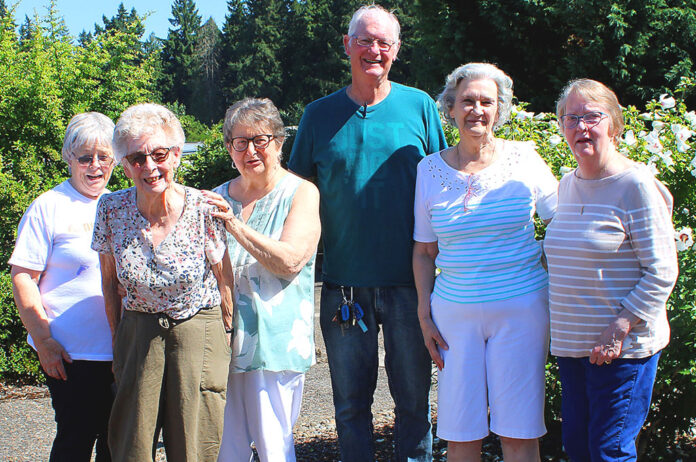
Homeowners in larger manufactured-home parks and marinas in Oregon are tentatively breathing a sigh of relief after the Oregon Legislature passed a bill in the 2025 session that places caps on space rentals starting in 2026, but they are far from fully satisfied with the outcome.
Recently several residents of three local parks – Royal Villas, Eldorado Villas and King Village – who worked with their state legislators to get the bill passed – got together at the Royal Villas Clubhouse to talk about what the passage of the bill means to them.
All three parks, which have a total of about 540 spaces, are owned by Cal-Am Properties Inc., which was formed in 1988 and is based in Costa Mesa, Calif. According to its website, it is one of the largest privately held operators of RV resorts, manufactured home communities and apartment communities in the United States.
House Bill 3054 limits annual rent increases in manufactured-home parks and marinas with more than 30 spaces to 6 percent. The current law allows for a 7 percent increase plus inflation for a 10 percent maximum, which still applies to parks with 30 or fewer spaces.
A key element of the bill includes an exception to the rent cap to allow a 12 percent increase for infrastructure improvements if approved by a majority of tenants, and the bill prohibits landlords from requiring interior inspections or aesthetic or cosmetic improvements of homes as a condition for purchase.
Rita Loberger, who has lived in Eldorado Villas for 30 years, said she originally reached out to her state representative, then-Rep. Courtney Neron (D-District 26), about the rent-cap issue, and Neron came to Eldorado Villas in April 2024 to meet with about 115 people. “When I told her we are homeowners on rented land, she was surprised,” Loberger said.
John Spencer, who lives in King Village, said, “I presented a chart showing the last three years with average rent increases of 9.3 percent and charted it out to 2035, when the average monthly rent would be $3,000. She really appreciated the information.”
A larger town hall with residents from all three parks was held at Royal Villas in May 2024 with Neron, Sen. Aaron Woods (D-District 13), and Rep. Ben Bowman (D-District 25).
After listening to the residents’ concerns, the legislators suggested that they write letters to House and Senate members about the issue.
“I canvassed all my neighbors and prepared letters for them to sign,” said Kathy Elliott, who has lived in Royal Villas for 14 years. “The legislators send a letter to Cal-Am in June with a lot of questions and got no response.”
In September Elliott, Spencer, Loberger and Royal Villas resident Pat Bishop met with Woods, Bowman and Neron at their Capitol offices’ conference room for a half-hour to discuss the issue and present them with 600 letters from the three parks’ residents.
As the bill wound its way through the legislative process, dozens of park residents rode to Salem in a yellow school bus driven by Spencer to participate in a February House committee hearing and later returned for a Senate committee hearing. During the process, Woods died of cancer, and Neron was appointed to his seat. House Bill 3054 was eventually passed and signed by Gov. Tina Kotek.
“It’s a little bitter-sweet,” Spencer said. “It was a win, but 6 percent is a compromise. If people are on a fixed income, it will still affect them, and that was my purpose in fighting this. If I wasn’t still working, I don’t think I could afford to live here. It’s not what we wanted knowing that other states have even lower rates. It should be revisited in the future, and I think it will be.”
Elliott added, “The rent increase allowed under the bill should have been 4 percent. The rent increases used to be the same as the Social Security increases until they started going higher. It’s disappointing.”
Talking about the complexities of going through the legislative process, Bishop said, “I knew it was complex, but I had no idea how complex it would be, and people in the park were very interested in the process.”
Elliott added, “It takes patience, and the legislators had a lot of do this session. For a lot of us, this was our very first time being involved in the legislative process.”
Karen Grissom said, “They don’t have our best interests in mind. This is supposed to be affordable housing. It helped that we had each other in the different communities instead of feeling isolated.”
Elliott noted that some people were afraid to sign a letter because they were afraid of retaliation. “I came back the next day with a copy of Oregon’s retaliation law to show them they had nothing to fear,” she said. “Once the movement started, it grew fairly quickly.”
Bishop pointed out that “a lot of people here really got involved, although it touched everyone.”
Cal-Am Properties Inc. was contacted twice for this story to present its side of this issue but did not respond.





















